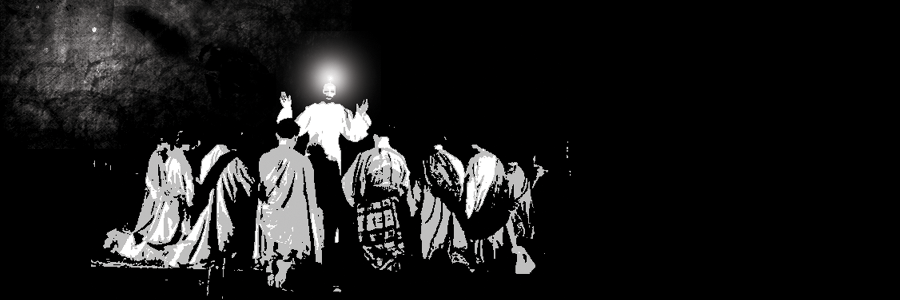Scottish poet Hugh McDairmid is considered the “most important” modern poet of Scotland. He likely was an Enneagram 5, taking to heart the idea (from Rilke), that ‘the poet must know everything’ and strove to write poetry that contained all knowledge (shades of Comenius!). He had one of the best comebacks to the accusation of being a plagiarist: ‘The greater the plagiarism the greater the work of art.’ MacDiarmid is one of those enigmatic poets who, not a Christian (he was Communist) nevertheless produced some great Christian poems. His poem, “I heard Christ Sing” inspired this graphic (computer with sketch pad):

I Heard Christ Sing
I heard Christ sing quhile roond him dar
The twal� disciples in a ring,
And here�s the dance I saw them dance,
And the sang I heard him sing.
Ane, twa, three, and their right feet heich,
Fower, five, six, and doon wi� them,
Seevin, aught, nine, and up wi� the left,
Ten, eleven, twal�, and doon they came.
And Christ he stude I� the middle there,
And was the thirteenth man,
And sang the bonniest sang that e�er
Was sung sin� Time began.
And Christ he was the centerpiece,
Wi� three on ilka side.
My hert stude still, and the sun stude still
But still the dancers plied.
O I wot it was a maypole,
As a man micht seek to see,
Wi� the twal� disciples dancin� room�,
While Christ sang like a lintie.
The twal� points o� the compass
Made jubilee roon� and roon�,
And but for the click-click-clack o� the feet,
Christ�s sang was the only soon�.
And there was nae time that could be tauld
Frae a clock wha�s haun�s stude still,
Quhile the figures a� gaed bizzin roon�
—I wot it was God�s will.
Wersh is the vinegar,
And the sword is sharp.
Wi� the tremblin� sunbeams
Again for my harp,
I sing to Thee.
The spirit of man
Is a bird in a cage,
That beats on the bars
Wi� a goodly rage,
And fain �ud be free.
Twice-caged it is,
In life and in death,
Yet it claps its wings
Wi� a restless faith,
And sings as it may.
Then fill my mouth
Wi� the needfu� words
That sall turn its wings,
Into whirlin swords,
When it hears what I say.
Hearken my cry,
And let me speak,
That when it hears
It shall lift its beak,
And sing as it should.
Sweet is the song
That is lost in its throat,
And fain �ud I hear
Its openin� note
As I hang in the rood.
And when I rise
Again from the dead,
Let me, I pray,
Be accompanied
By the spirit of man.
Yea, as I rise
From earth to Heaven
Fain �ud I know
That Thou hast given
Consent to my plan—
Even as the stars
Sang here at my birth,
Let Heaven hear
The song of the earth
Then, for my sake.
The thorns are black
And callous the nails.
As a bird its bars
My hand assails
Harpstrings . . . that break!
O I wot they�ll lead the warl� a dance
And I wot the sang shall be,
As a white sword loupin� at the hert
O� a� eternity.
Judas and Christ stude face to face,
And mair I couldna� see,
But I wot he did God�s will wha made
Siccar o� Calvary.
—Hugh MacDiarmid

